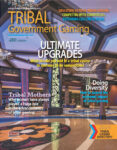
As a proud Renoite, I frequently—perhaps too frequently—like to say that I am a child of the commercial land-based casino industry, having been in and around them for the entirety of my youth and adolescence. The idea of corporate entities planning, building, opening and expanding casino resorts as a means to drive shareholder value and generate profits is familiar to me, in the same way that I would imagine Idahoans are familiar with potato farms or Mainers and their lobster fisheries.
By contrast, I had no experience whatsoever with tribal gaming prior to joining GGB, and the last two years have served as an extremely fascinating and enjoyable crash course into an entirely distinct, invaluable and often underestimated sector that is continuing to grow in size and scope.
One lesson that has been particularly hard for someone like me to understand is that the pride and sincerity of tribal operators stems directly from their utilization of gaming not purely as a money-maker, but as a means to provide basic services and resources for their people that would otherwise not be available. This ideology will forever separate the two sides of the industry, because their respective outlooks will never match—one faction thinks seven generations into the future whereas the other thinks about quarters and fiscal years. Having now migrated to Southern California, I have had the pleasure of observing this philosophy firsthand.
Of the many themes that flow throughout Indian Country, one that is especially prevalent in this year’s edition of Tribal Government Gaming is that of diversity, in many different aspects.
The cover story, from Frank Legato, explores the increasingly broad range of high-end amenities that operators are bringing to their properties; my own story highlights the plethora of gaming and non-gaming business ventures that tribes have now begun exploring in the name of economic diversification; and The Innovation Group explains how Washington state has emerged as a new tribal hotspot, distinct from others already cultivated in the West and Midwest.
Additionally, Marjorie Preston touches on the diverse representation seen throughout the industry, and the importance of female leadership in key roles; and Bill Sokolic gives insight as to how smaller tribes are entering the business with new perspectives and innovations next to their larger, more established counterparts.
Finally, Q&As with former NIGC Chairman E. Sequoyah Simermeyer and Palms General Manager Cynthia Kiser Murphey underscore new developments in tribal regulation and operation, respectively; and columns from San Diego State University’s Dr. Kate Spilde and PMI’s Carl Long shed light on fresh avenues in education and purchasing.
One of the touchstone mottos of the United States is “e pluribus unum,” or “out of many, one.” Conversely, the enactment of the Indian Gaming Regulatory Act in 1988 gave rise to a new field—tribal gaming—that has since been adopted and interpreted by an expanding number of sovereign nations, each of which brings its own unique voice to a conversation that spans from coast to coast. In this way, it could be said that tribal gaming is not in fact one industry, but many.
To be sure, this is an exciting time for Indian gaming, an era that is increasingly defined by success and prosperity. From humble beginnings in bingo halls or in some cases nothing at all, tribes have built world-class resorts, expanded into new domestic and international markets and successfully defended their legal rights in several high-profile battles against commercial interests.
We hope you enjoy our tribute to the sector that brings a necessary human presence to the gaming ecosystem, one that reminds us what cooperation and inclusion really embody.


















